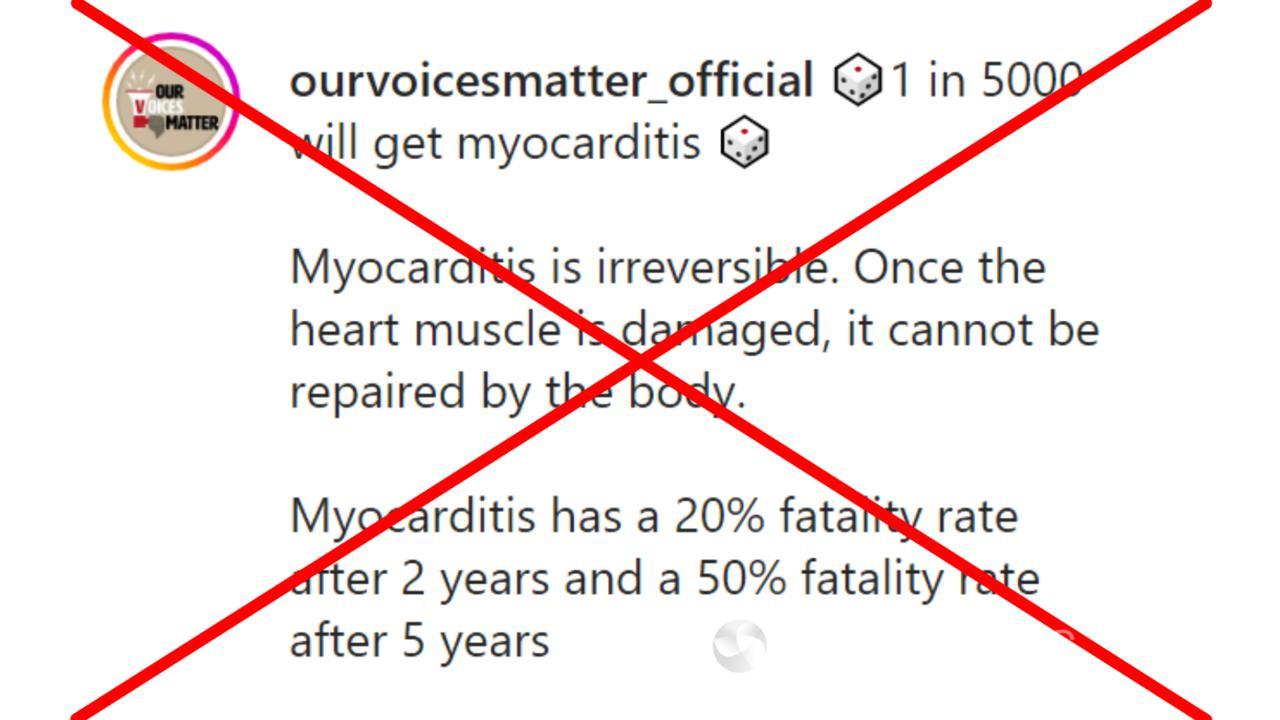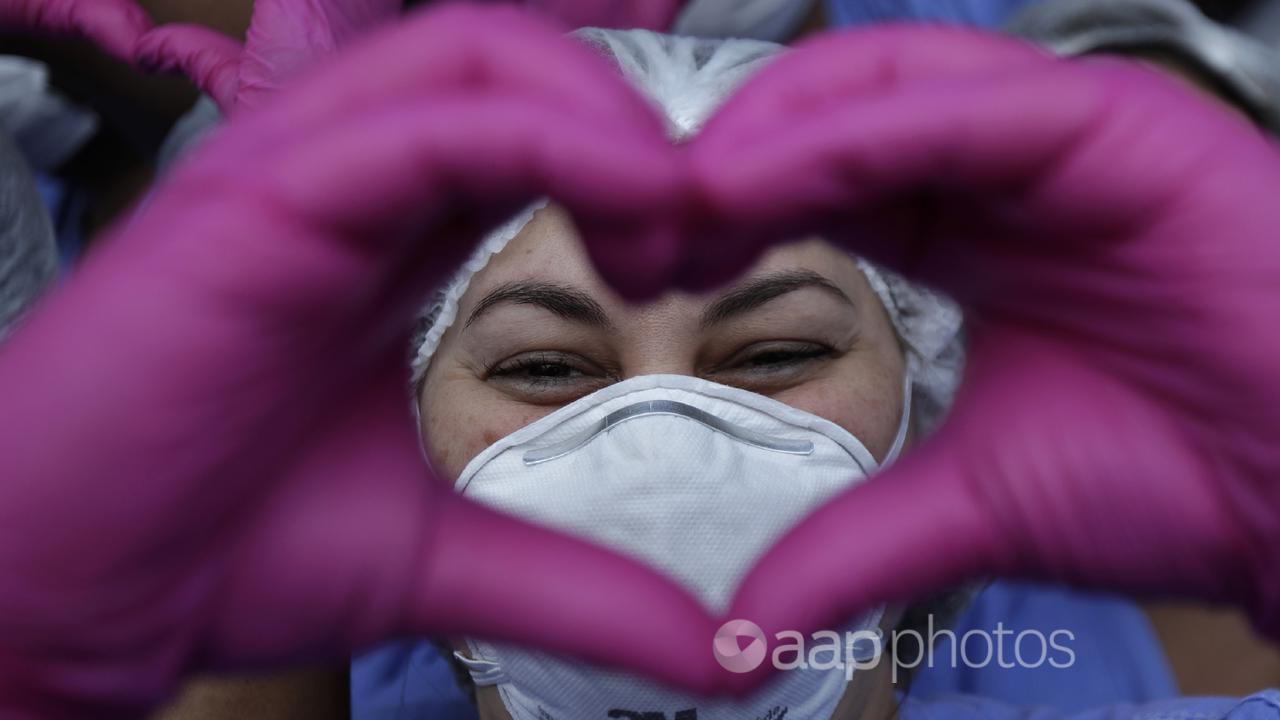As Australia expands access to a second COVID-19 booster vaccine for people aged 30 and over, misinformation about the jabs causing myocarditis continues, with a claim heart muscle “damage” from the condition is irreversible.
But cardiologists told AAP FactCheck the claim is not true, and rare cases of myocarditis following the vaccine are mostly mild and recovery is the norm.
Myocarditis is characterised by inflammation of the heart muscle, which enlarges and weakens the heart. Scar tissue often develops from the inflammation, forcing the heart to work harder as it pumps blood and oxygen throughout the body. Common symptoms include chest pain, abnormal heart rhythm, and shortness of breath.
The claim about myocarditis being irreversible is made in an Instagram post that shares a short video from a press conference in Canada, in which the risk of myocarditis from the COVID vaccine is discussed.
Text with the post states: “1 in 5000 will get myocarditis. Myocarditis is irreversible. Once the heart muscle is damaged, it cannot be repaired by the body. Myocarditis has a 20% fatality rate after 2 years and a 50% fatality rate after 5 years.”
The claim echoes a Facebook post taken from a blog article on conspiracy website Great Mountain Publishing. The blog’s claims were the subject of fact checks in late 2021 (see here and here), which assessed the claim myocarditis is irreversible as false.
Heart experts also told AAP FactCheck the claim is incorrect.
Associate Professor Aaron Sverdlov, director of heart failure at University of Newcastle’s School of Medicine and Public Health, says myocarditis isn’t irreversible and most cases associated with COVID vaccines are mild.
“Most mild cases do resolve spontaneously; some cases require a course of medications to help recovery. Irreversible cases are extremely rare,” Dr Sverdlov said in an email.
Dr Sverdlov said the claim myocarditis had a 20 per cent fatality rate after two years and a 50 per cent rate after five years was also wrong.
“What they seem to be quoting is a general statement regarding severe heart failure (which is an uncommon complication of myocarditis). Currently reported mortality from COVID-vaccine associated myocarditis is around 1%,” he said, referencing a 2022 study on myocarditis after mRNA vaccination.
Referencing two further studies (here and here), Dr Sverdlov said: “The overall incidence of myopericarditis following COVID-19 vaccination is 18 per million vaccine doses. Compared with COVID-19 vaccines, the incidence of myopericarditis was higher following vaccination for smallpox (132 per million vaccine doses) and did not differ significantly with the incidence of myopericarditis following influenza vaccination (1.3 per million vaccine dose) or other non-smallpox vaccination (57 per million vaccine doses).”

Isuru Ranasinghe, senior staff specialist cardiologist and associate professor in cardiology at Prince Charles Hospital in Queensland, told AAP FactCheck myocarditis can occur after vaccination, but is uncommon. He also said most cases were mild and recovery without permanent damage was the norm.
Referencing a 2021 study, Dr Ranasinghe said the incidence of myocarditis after COVID-19 vaccination was 2.1 per 100,000 people with at least one dose, but higher in young males. Recovery without complications was the norm and most patients recovered completely.
“One of the key things people don’t seem to be aware of (or appreciate) is that COVID itself can cause myocardial injury characterised by evidence of a rise in cardiac biomarkers (Troponin),” Dr Ranasinghe said in an email.
“In the multicentre Auscovid registry that our hospital and several others took part in, we found nearly a third of COVID patients had elevated troponin values with these patients having a higher death rate. Thus, the risk of heart involvement and other undesirable outcomes are much worse with COVID when compared to the small risk of myopericarditis from the vaccine.”
Abdul Ihdayhid, a cardiologist and research leader in cardiovascular biology at Curtin University’s Faculty of Health Sciences, said myocarditis could be irreversible but it was important to differentiate the condition’s causes, referencing four studies – here, here, here and here.
“The myocarditis that we traditionally deal with as cardiologists is viral myocarditis from viruses that cause the common cold and flu, and the vast majority of them are self limiting,” Dr Ihdayhid told AAP FactCheck in a phone interview.
“And they’re mild, but there are a subset of patients who develop quite devastating myocarditis that can progress to heart failure, needing to go on life support and sometimes a heart transplant.
“And then there’s a COVID vaccine related myocarditis … which has been recognised as a rare side-effect of the vaccine. It most commonly affects young people under the age of 40 and in men more than women. In the vast majority of cases the symptoms have been mild with a self-limiting course (>98%) not requiring intensive treatment.”
“And overall, the data suggests that your risk of myocarditis is much higher from the actual COVID infection itself and the risk of complications with COVID.”
The Verdict
The claim myocarditis is irreversible is false. Cardiologists told AAP FactCheck the majority of rare cases of the condition after a COVID-19 vaccine recover completely without any permanent damage to the heart.
The post’s claim regarding high fatality rates after two and five years is also false. Experts say rare cases of viral myocarditis can be irreversible and lead to death, but most make a full recovery.
False – The claim is inaccurate.
* AAP FactCheck is an accredited member of the International Fact-Checking Network. To keep up with our latest fact checks, follow us on Facebook, Twitter and Instagram.
All information, text and images included on the AAP Websites is for personal use only and may not be re-written, copied, re-sold or re-distributed, framed, linked, shared onto social media or otherwise used whether for compensation of any kind or not, unless you have the prior written permission of AAP. For more information, please refer to our standard terms and conditions.


















